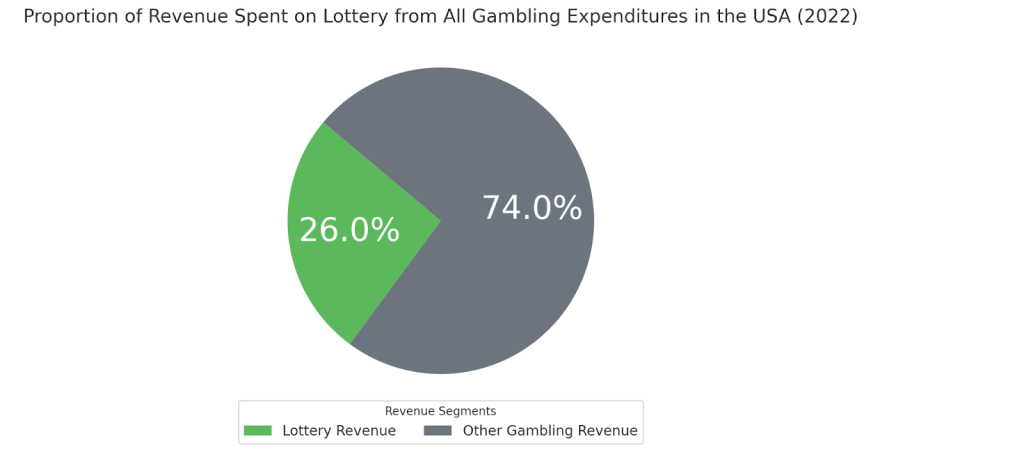Lotteries are a heavyweight contributor within the U.S. gambling industry, generating an impressive market size of around $100 billion annually. This estimated figure reflects the total revenue generated by state lotteries across the nation, encompassing sales from draw games, scratch-off tickets, and other lottery products. The sheer scale of this revenue underscores the lottery sector's substantial impact and highlights its potential as a lucrative opportunity for iGaming operators.

As the sector continues to evolve, sportsbooks have a growing opportunity to integrate lottery offerings into their platforms. While challenges exist—like regulatory hurdles, significant competition from the retail sector, and the reluctance of many states to allow interactive lottery products—the inherent trust associated with state lotteries provides a considerable advantage. Players often feel more secure placing bets with established lottery brands, making it easier for sportsbooks to capture their interest.
With the rapid growth of digital gambling, online lottery (iLottery) betting is becoming another avenue for sportsbooks to diversify and expand their offerings. Not least, it aligns with the increasing demand for convenient and reliable gaming experiences, appealing to a broader audience and helping sportsbook brands strengthen customer loyalty. Moreover, by collaborating with well-established lottery brands, sportsbooks can bridge the gap between traditional and digital products, capitalizing on a trusted and lucrative market segment.
Biggest Lotteries in the United States
From Powerball’s record-breaking payouts to Mega Millions’ colossal jackpots, the U.S.’s lotteries command serious attention. California’s SuperLotto Plus, Florida Lotto, and Texas’ iconic Lotto Texas lead the charge, while gems like Arizona’s The Pick and Indiana’s Hoosier Lotto offer their unique appeal for participants. Each has its own winning formula, attracting millions and generating substantial revenue nationwide.
1. Powerball: $2.04 billion (November 2022)
Powerball, launched in 1992 and operated by the Multi-State Lottery Association, is America’s biggest lottery game. Draws are held twice weekly, attracting millions of hopeful participants. With billions wagered annually, Powerball’s reach is vast and open to anyone over 18 in participating states. Its most significant jackpot win reached an astonishing $2.04 billion in November 2022, setting the record for the highest win in lottery history.
2. Mega Millions: $1.602 billion (August 2023)
Mega Millions, launched in 1996, is one of America’s most popular lotteries, managed by a consortium of state lotteries (10 in total). With draws twice weekly, it attracts millions of participants and billions in annual wagers from adults across 45 states. The lottery's most jaw-dropping prize stands at $1.602 billion and was claimed in August 2023, setting a record-breaking milestone in its history.
3. SuperLotto Plus (California): $193 million (February 2002)
SuperLotto Plus, introduced in 1986, is California’s flagship lottery game, operated by the California State Lottery. It offers bi-weekly draws, luring millions of ticket buyers with enticing odds and hefty payouts. Open to players over 18, this popular draw also attracts annual wagers in the billions. The largest jackpot win to date? A staggering $193 million was claimed in 2002.
4. Lotto Texas: $145 million (June 2004)
Lotto Texas, the state’s hallmark jackpot game, has been enticing players since 1992. Operated by the Texas Lottery Commission, it draws twice weekly, bringing in millions of hopeful participants each time. With substantial annual wagers, the allure—like all the biggest lotteries—lies in its massive payouts. Its largest prize? A record $145 million jackpot was won in 2004, making Lotto Texas a defining fixture in the state’s lottery market.
5. Florida Lotto: $81.6 million (March 2022)
Since 1988, Florida Lotto has been attracting millions twice weekly under the management of the Florida Lottery. Renowned for its simple yet appealing format, Florida Lotto draws significant yearly wagers, becoming a favorite among Floridians aged 18 and up with a record jackpot of $81.6 million. Oddly enough, it once featured a prize of free gasoline for 20 years.
6. New York Lotto: $72.5 million (October 1994)
The New York Lotto, introduced in 1978, is run by the New York State Gaming Commission. Featuring offerings such as the traditional Lotto and the fast-paced Quick Draw, the New York Lotto attracts players looking for various ways to test their luck. The largest jackpot hit an astounding $72.5 million, and interestingly, early winners were awarded their prizes as lifelong annual payments, earning a reputation for delivering dreams in installments.
7. Hoosier Lotto (Indiana): $54.5 million (November 2007)
The Hoosier Lotto, Indiana’s premier lottery game, has been a fixture since 1994. Operated by the Indiana Lottery, it offers traditional Lotto draws alongside popular picks like Quick Draw and Cash4Life. The biggest jackpot was an impressive $54.5 million win in 2007. Notably, it’s one of the few lotteries where winners can opt for flexible payout periods, giving players greater control over their winnings.
8. Lotto America: $40.03 million (March 2018)
Lotto America, revived in 2017 after its original launch in 1988, is a multi-state lottery run by the Multi-State Lottery Association. It offers draws with traditional number picks and an intriguing All Star Bonus feature. Its record jackpot stands at $40.03 million. In this lotto, winners can boost their non-jackpot prizes by up to five times with the All Star Bonus.
9. Michigan Lotto 47: $32.3 million (October 2021)
The Michigan Lotto, launched in 1972 and run by the Michigan Lottery, is a staple in the state’s gaming offerings. Alongside its classic Lotto 47 and Fantasy 5 games, it captured the imagination of millions with its largest jackpot prize of $32.3 million. Uniquely, Michigan’s lottery once offered winners the quirky option of receiving their winnings in gold bullion instead of cash.
10. Illinois Lotto: $37.5 million (April 1989)
The Illinois Lotto, established in 1974, is operated by the Illinois Lottery and remains a cornerstone of the state’s gaming sector. Alongside the main Lotto game, it offers a variety of options, including Pick 4 and Lucky Day Lotto. The biggest jackpot reached was a whopping $37.5 million in 1989. In a unique twist, early players could choose between receiving cash or a luxury car as part of their prize.
11. New Jersey Pick-6 Lotto: $48.9 million (May 2004)
The New Jersey Pick-6 Lotto, launched in 1980, is the state’s flagship draw game. Managed by the New Jersey Lottery, it offers additional games like Jersey Cash 5 and Quick Draw. The biggest prize hit a very respectable $48.9 million in 2004. In the early days, this lottery once offered a “roll down” feature, distributing unclaimed jackpot money across lower-tier prizes, which boosted winnings for lucky secondary players.
12. Arizona The Pick: $13.5 million (June 2007)
The Pick, Arizona’s premier lottery game since 1984, is run by the Arizona Lottery and offers draws twice weekly. Players can also enjoy additional games like Fantasy 5 and Triple Twist, with the largest jackpot reaching $13.5 million in 2007. Historically, The Pick once allowed winners to take their prize in a combination of cash and gold coins.
What is iLottery?
iLottery refers to the digital version of traditional lottery games that are played and managed online. It enables players to participate in lottery games through websites or mobile apps, offering convenience and a more comprehensive range of game options. iLottery platforms typically include draw-based games (like Powerball or Mega Millions), instant win games (such as scratch cards or instant Keno), and other digital lottery offerings.
Key Features of iLottery:
-
Digital Ticket Purchases: Players can buy tickets for traditional lottery draws online, eliminating the need to visit physical retailers.
-
Instant Win Games: iLottery platforms often offer online scratch-offs, Keno, and other instant win games with immediate results.
-
Automatic Number Checking: iLottery systems automatically check and notify players of their winnings, reducing the risk of missing out on a prize.
-
Secure Payments: Players can deposit funds, purchase tickets, and withdraw winnings securely through trusted payment options.
-
Player Accounts: iLottery users can set up accounts to track their purchases, check results, and manage funds in one place.
Online Alternatives to Traditional Lotteries
Beyond physical lottos and lottery syndicates, there are alternative options that provide similar excitement and winning potential without participating directly in lottery draws. These alternatives offer bettors a variety of ways to enjoy the thrill of lotteries with the potential to win large cash prizes.
Here are some popular online alternatives to traditional lottery draws:
-
Lottery Betting
Lottery betting allows bettors to wager on the outcome of popular international lotteries without buying actual lottery tickets. Platforms like Lottoland or Jackpot.com let players bet on the winning numbers of global lotteries like EuroMillions or Mega Millions, offering payouts equivalent to the official prizes. -
Number Betting on Sportsbooks
Many sportsbooks offer number-based games that mimic lottery draws, allowing bettors to select numbers and wager on the results. These games often include variations of Keno, bingo, or custom-number draws, providing a fast-paced alternative to traditional lotteries. -
Virtual Lottery Games
Virtual lottery games in online casinos and sportsbooks simulate lottery draws using random number generators (RNG). These games often have shorter intervals and offer immediate results, making them appealing to those who enjoy quick gameplay. -
Instant Win Games
Online instant win games such as digital scratch cards, pull-tabs, and dice games are popular alternatives to traditional lottery tickets. Bettors can play these games instantly and win cash prizes by matching numbers, symbols, or card values. -
Keno
Keno is a traditional lottery-like game available in many casinos and online platforms. Players select numbers, and payouts are based on how many match those drawn. It offers frequent draws and varied betting options, appealing to fans of number-based games. -
Daily Fantasy Sports (DFS)
DFS gives bettors the chance to create fantasy lineups and compete for cash prizes based on real-world sports performances. Platforms like DraftKings and FanDuel allow players to bet on the outcomes of their fantasy teams, blending sports betting with jackpot excitement. -
Raffles and Online Draws
Some online casinos and sportsbooks offer raffles and prize draws, which work similarly to lotteries. Players buy virtual tickets and await the draw to see if they win. These are often tied to loyalty or VIP programs and offer prizes ranging from cash to luxury items or experiences. -
Slot Games with Progressive Jackpots
Progressive slot games are another alternative where a portion of every bet contributes to a growing jackpot. These games, available on online casino platforms, deliver the thrill of chasing a massive payout—much like hitting a lottery jackpot.
Interested in adding iLottery and instant win games to your platform? Reach out now to book a demo and discover how to boost player excitement with Altenar’s instant win integration.
The Benefits of Including Lotteries in Sportsbooks
In addition to enhancing brand trust and strengthening customer loyalty, incorporating lottery products into online sportsbooks offers numerous other benefits for iGaming operators. For starters, players who already engage with lotteries are more likely to explore other gaming options, increasing overall engagement in betting activity. Moreover, lotteries appeal to a broader demographic, allowing sportsbooks to diversify their audience, improve cross-sell opportunities, and ultimately drive higher revenue. This strategy also helps build a well-rounded offering, positioning operators as comprehensive gaming destinations.
The main benefits include:
-
Enhanced Brand Trust and Customer Loyalty
Adding lottery products boosts credibility by tapping into the strong reputation state lotteries hold. Players already trust these well-established games, which translates into increased confidence in the sportsbook’s overall offerings.
-
Diversified Audience and Increased Engagement
Lotteries attract a diverse player base, providing sportsbooks access to segments that might not typically engage with sports betting. This expanded reach encourages cross-selling opportunities and deeper player engagement.
-
Positioning as a Comprehensive Gaming Destination
By combining lotteries with traditional betting, operators can position themselves as all-inclusive gaming platforms, increasing customer retention and enhancing player experience and satisfaction. -
Improved Cross-Sell Opportunities
Integrating lotteries creates opportunities to cross-sell other betting and gaming products. Players drawn in by familiar lottery games may be more inclined to explore sports betting or casino games similar to lotteries, like bingo, Keno, scratch cards, etc.
-
Cost-Efficient Player Acquisition
Lotteries can serve as a cost-effective tool for acquiring new players. Leveraging the appeal and trust of lotteries reduces the need for extensive marketing efforts, as familiarity with lottery games often drives organic engagement.
-
Increased Play Frequency and Revenue Stability
Lottery games generally feature frequent draws and quick-win opportunities, which keep players returning regularly. This consistency helps maintain steady revenue and encourages repeat visits to sportsbooks. -
Higher Revenue Streams through Familiar Products
Lotteries are a consistent revenue generator due to their widespread popularity and familiarity. Integrating these products allows sportsbooks to broaden their revenue base while offering reliable, familiar games that appeal to new and existing players.
Integrating Lotteries into Sportsbooks
Integrating U.S. lotteries into existing sportsbook operations requires significant planning, as lotteries present legal, regulatory, and technical considerations. From a regulatory standpoint, lottery laws vary widely across states, meaning operators must comply with different licensing and responsible gambling requirements. Some jurisdictions also resist digital lottery offerings due to the influence of brick-and-mortar retailers and concerns over underage access—despite current safeguards like online age verification.
From a technical perspective, integration can be complex. Operators need secure, scalable digital infrastructure to manage high-frequency transactions and maintain game integrity. Lotteries must seamlessly integrate into existing sportsbook platforms while delivering a consistent user experience. They also must comply with geo-restriction and player verification protocols to avoid regulatory risks.
Best practices for smooth integration include:
-
Align lottery offerings with local regulatory requirements.
-
Maintain secure and scalable digital infrastructure.
-
Implement transparent payment and withdrawal policies.
-
Prioritize responsible gambling features and user verification.
-
Build strong relationships with state regulators and retailers.
Campaign Strategies, Tips, and Advertising Techniques
One of the most effective ways to enter the online lottery market is to use targeted campaign strategies that appeal to both lottery enthusiasts and sports bettors. A proven approach is running cross-promotions that reward customers for participating in both activities. For example, offering a bonus or free bet to users who buy lottery tickets and place wagers encourages cross-engagement and increases player value.
Another smart strategy is personalizing campaigns based on user behavior. By analyzing data, operators can spot opportunities and tailor promotions to specific demographics. This could include themed draws or seasonal events that align with user interests—boosting engagement and loyalty.
Marketing campaigns tied to major sports events or holidays also help capture the attention of both casual lottery players and sports bettors. Adding progressive jackpots to these events builds excitement and increases frequency of participation due to larger potential payouts.
Some U.S. bookmakers have successfully integrated lotteries into their platforms through strategic targeting. DraftKings, for instance, capitalized on its large user base by cross-selling between sports betting and lottery offerings—enhancing retention.
DraftKings, a pioneer in fantasy sports, also leveraged its mobile app to offer lottery draws via a user-friendly interface. This seamless experience made adoption easy for sports betting users and helped build trust.
In essence, DraftKings succeeded by promoting lotteries as accessible, reliable, and familiar. Through data-driven personalization, they crafted segmented campaigns aligned with user preferences—maximizing engagement and lifetime value.
In states like New Jersey, where online lottery is legal, successful operators have positioned lotteries as an integrated part of the gaming experience. Emphasis on ease-of-use and convenience in both UI and messaging has proven especially effective.
The Future of iLottery: Challenges and Considerations
The future of iLottery in the United States looks promising as player demographics shift and gaming becomes more digital. States like Virginia and Michigan have shown that tapping into tech-savvy audiences who value convenience can lead to strong results. These early successes will likely inspire other jurisdictions to explore iLottery as sportsbooks aim to modernize and unlock new revenue.
Still, resistance remains. Traditional retail lottery operators often push back on digital expansion due to fear of lost revenue—even though data shows that online channels are not significantly cannibalizing retail sales.
For ambitious sportsbooks, the key to success is balancing innovation with regulation, building partnerships with stakeholders, and earning long-term trust in the iLottery space.













